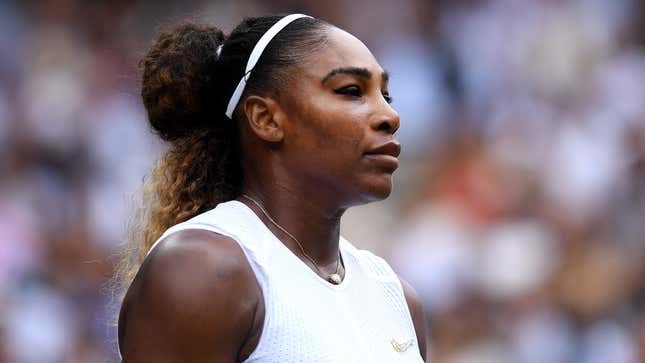
“The day I stop fighting for equality and for people that look like you and me will be the day I’m in my grave,” said Serena Williams, at a press conference following Saturday’s loss in the Wimbledon finals. The statement was made after a female reporter referenced previously published opinions that Williams should “stop being a celebrity for a year and stop fighting for equality, and just focus on the tennis.”
As reported by Metro UK, one of those comments came from a personal hero and colleague of Williams’, Billie Jean King.
“I don’t know if she knows what she wants right now or not. But as you get older, you have to work harder,” King said in late June. “She’s got business, a baby, she’s trying to help gender equity, particularly for women of color, she’s actually on the Billie Jean King leadership initiative, she and Venus are both advisors for it.
“[It makes winning a Slam] much harder. I would like to see her put everything else aside from that,” King continued. “This is just a wish I have, it’s not fair to her, but I wish she would just make a commitment for the next year-and-a-half to two years and just say, ‘I’m going to absolutely devote what’s necessary for my tennis so when I look in the mirror when I’m older that I can go back in my mind and know I gave everything I had and be happy.’”
“But if she’s happy doing it this way it’s fine. It’s not about us,” King concluded.
No, Williams’ choices aren’t about us—and yet, they are. As Refinery29 reminds us, she’s actually been in the longest face-off of her career, as she and sister Venus have taken on the battle of pay equity both within and beyond the world of tennis for well over a decade. In fact, 32 years after King played the “Battle of the Sexes” against Bobby Riggs in 1973, Venus lobbied Wimbledon and the French Open for equal pay between male and female players in 2005 [h/t USA Today]—and ultimately, succeeded. And for Black Women’s Equal Pay Day 2017, Serena penned an essay for Fortune magazine that specifically explained how the pay gap affects black women, which read, in part:
I am in the rare position to be financially successful beyond my imagination. I had talent, I worked like crazy and I was lucky enough to break through. But today isn’t about me. It’s about the other 24 million black women in America. If I never picked up a tennis racket, I would be one of them; that is never lost on me.
The cycles of poverty, discrimination, and sexism are much, much harder to break than the record for Grand Slam titles. For every black woman that rises through the ranks to a position of power, there are too many others who are still struggling. Most black women across our country do not have the same support that I did, and so they often don’t speak out about what is just, fair and appropriate in the workplace. When they do, they are often punished for it.
So, whether on or off the court and even if she never wins another Grand Slam, Williams remains a champion in our book. And following the Wimbledon press conference, King wisely made sure to clarify her comments as well, tweeting, “I would never ask anyone to stop fighting for equality. In everything she does, Serena shines a light on what all of us must fight for in order to achieve equality for all.”



